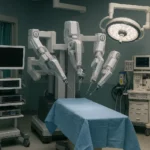Liver Transplant for Hepatitis & Cirrhosis
It is a matter of life and death when your own powerhouse liver starts to go down due to chronic liver disease or cirrhosis. For a person suffering from advanced liver damage due to hepatitis or cirrhosis, liver transplant can provide a second chance in life.
But the question is – What exactly is involved in this procedure? What is the cost of transplantation in India? What is the success rate of liver transplant surgery in India? And where can you find the best liver transplant hospital in India? This guide contains all the answers.
Why Are Hepatitis & Cirrhosis Causes of Liver Transplantation?
Hepatitis causes liver inflammation for more than 6 months, especially Hepatitis B and Hepatitis C lasting for years. Such inflammation will then progress into chronic liver disease, leading up to end-stage liver disease. Sometimes, severe hepatitis medication can be helpful in reducing the progress of liver damage, but the only option is liver transplant when it loses function completely.
The patient having cirrhosis due to untreated hepatitis would have scarring at the most advanced level, and the cause is alcohol abuse or fatty liver disease. Effects of liver function are disturbed and become, it cannot be reversed, so a liver transplant is the best treatment option.Without it, potential complications could include internal bleeding, kidney failure, or liver cancer.
When Should the Doctor Recommend Liver Transplantation?
A liver transplant is not the immediate treatment to offer but it becomes a consideration when all other medical therapies have been exhausted. The Model for End-Stage Liver Disease (MELD) scoring system may be employed by doctors to assess the severity of liver disease. More often than not, a higher MELD score points toward a greater urgency for transplantation.
Common indications for liver transplantation include:
- Severe fatigue and weakness
- Altered mental status or confusion (hepatic Encephalopathy)
- Jaundice (yellowing of the skin and eyes)
- Uncontrolled accumulation of fluid in the abdomen
When these symptoms impair day-to-day living and no medical or therapeutic intervention seems to help, a recommendation for liver transplantation becomes an option.
The Process of a Liver Transplant: A Walk Through the Steps
- Evaluation: The journey begins with a comprehensive medical evaluation including blood investigations, imaging, psychological evaluation and consultation by various specialists.
- Finding a Donor: The donor can be either living (usually a close relative) or deceased. In this case, a small piece of donor’s liver will be used because the liver is capable of regeneration.
- Surgery: Liver transplant surgery involves the removal of the recipient’s diseased liver and replacement with the healthy donor liver, an operation lasting about 6 to 12 hours, depending on the complexity.
- Recovery: After surgery, the patients will be watched in the Intensive Care Unit (ICU) for a few days and then will be shifted from there to a regular ward for about 10–15 days. Moreover, for long rehabilitation, they need medications to prevent rejection of the organ and regular follow-ups.
Cost of Liver Transplant: What to Expect
Yes, those countries constitute a wide spectrum in pricing liver transplants. In terms of affordability, India is one of the cheapest sites to have a liver transplant without compromising on quality.
- In India: $22,000-$30,000
- In the USA: $600,000-$800,000
- In Turkey: $70,000-$100,000
- In Thailand: $50,000-$70,000
Hepatitis C treatment costs in India around $500 to $1,000, depending on the drug and the time taken. Compared to Western countries, India offers affordable yet world-class treatment, earning popularity for organ transplants and medical tourism.
Success Rates & Life After Liver Transplantation
Good news is that encouraging statistics with regards to the success of liver transplantation exist. In India, liver transplant success rates fluctuate from 85 percent to 90 percent depending on one-year survivor and around 70 percent for five-year survivor based on a patient’s condition and hospital expertise.
Life after a transplant includes:
- Regular checks
- Immunosuppressants all through life to prevent rejections
- A healthy daily routine: eating well, no alcohol, BP, and sugar control.
With good care, many patients resume a fulfilling life, with work, and travel.
World-class Hospitals for Liver Transplantation
India has some of the best technology hospitals in the field of liver transplant. Here are some more of the best liver transplant hospitals in India:
- Medanta – The Medicity, Gurgaon: Cutting edge technology and extremely high volume experience.
- Apollo Hospitals, Chennai & Delhi: One of the first liver transplant hospitals in India.
- Max Super Speciality Hospital, Delhi: Exceptional success rates with post-operative care.
All of these hospitals are accredited by NABH or JCI, which means that they are at par with global standards of care. In addition, they provide multilingual assistance, travel support, and individualized patient care for international visitors.
Right Country or Hospital for Transplant
When choosing between the transplant venues, consider the following:
- Experience and credentials of the transplant team
- Cost of treatment and accommodation
- Availability of donors
- Hospital infrastructure and infection control
- Language and cultural support of international patients
India is emerging as the most competitive and attractive option for an international patient with its cost-friendly packages, specialised trained surgeons and immediately fast-tracked treatment process.
Why Should You Choose Regimen Healthcare?
At Regimen Healthcare, our commitment is to supporting patients with great compassion throughout their medical journeys, along with unshakeable transparency, and uncompromising trust. In addition, we collaborate with the best hospitals and liver transplant experts in India to ensure that you or your loved one is receiving the highest advanced level of tailored care possible.
What differentiates us from others:
- A caring patient team from first contact to the end of recovery
- Quick appointments with leading transplant physicians
- Transparent cost estimates with no hidden charges
- Visa assistance, airport pickup and support with accommodation arrangements, and interpreter support
- 24/7 assistance for international patients/families
We are not just a connection to hospitals; we stand along with you every step.
Why Should You Choose India for Liver Transplant?
India is in the forefront of liver transplant care because of many persuasive reasons:
World-class surgeons trained in premiere international institutes
- Affordable costs without compromising safety or outcome
- State-of-the-art hospitals with cutting-edge surgical technology
- Reduced waiting time for organ donors for liver transplants
- Doctors with English-speaking ability and multilingual support for overseas patients
Every year, thousands from Africa, the Middle East, Southeast Asia, and Europe travel to India for liver transplant surgery, due to its unique blend of affordability, quality, and good care.
Conclusion
Going through a diagnosis of cirrhosis or liver failure caused by hepatitis is awful. But thanks to advancements in liver transplant surgery and dedicated medical teams, one can have real hope. The liver transplant success rate in India is increasing incredibly, and with its reasonable costs, India has become one of the global hubs for patients seeking quality care.
Whether you’re searching for liver cirrhosis treatment, considering a transplant in end-stage liver disease, or looking for the best liver transplant hospital in India, this is the first step toward healing-it’s good to inform. If you or anyone else is traveling this path, know that you are not alone; tomorrow can still be bright.
If you are suffering from hepatitis, cirrhosis, or end-stage liver disease, don’t hesitate. Visit Regimen Healthcare today for a free consultation. Let us guide you through expert care, cost transparency, and the best treatment options available in India.
Call us at +91-9310356465
E-mail: [email protected]
You are not alone in this journey. We are here to help you heal and reclaim your life.
Frequently Asked Questions (FAQs)
1. Is liver transplant a cure for cirrhosis or hepatitis?
A liver transplant may improve quality of life and duration of life, but it is not deemed a “cure.” After transplant, one will require lifelong follow-up and medication to prevent organ rejection and manage overall health.
2. How long does a person live after the transplant?
If optimal care is provided, many patients live for many years. The one-year survival rate in India hovers around 85-90%, while the five-year survival figure is around 70%.
3. What is the average waiting time for a liver transplant in India?
Waiting durations may vary according to donor availability, condition of the patient, and hospitals. Living donor transplants can significantly reduce waiting time.
4. Can a family member donate part of his liver?
Yes, a living donor, usually a close family member, can donate a part of the liver. Both lives will regenerate over time.
5. What are the risks involved in liver transplant surgery?
Infection and bleeding, organ rejection, and complications due to anesthesia are very common risks of major surgeries. However, such risks are minimized by expert teams.
6. Is it safe for foreign patients to visit India for liver transplant?
Yes. Indeed, India is a premier place for medical tourism where one can avail of superior healthcare amenities, high-end international patient services, and multilingual support.
7. What medications are needed after liver transplant?
Immunosuppressants and other medications targeting overall health should accompany the medications required to avoid the organ rejection event.
8. Will I have to change my lifestyle after transplant?
Yes. Avoid alcohol; eat healthy, exercise, and follow your doctor’s directions for your long-term health and the success of the transplant.






